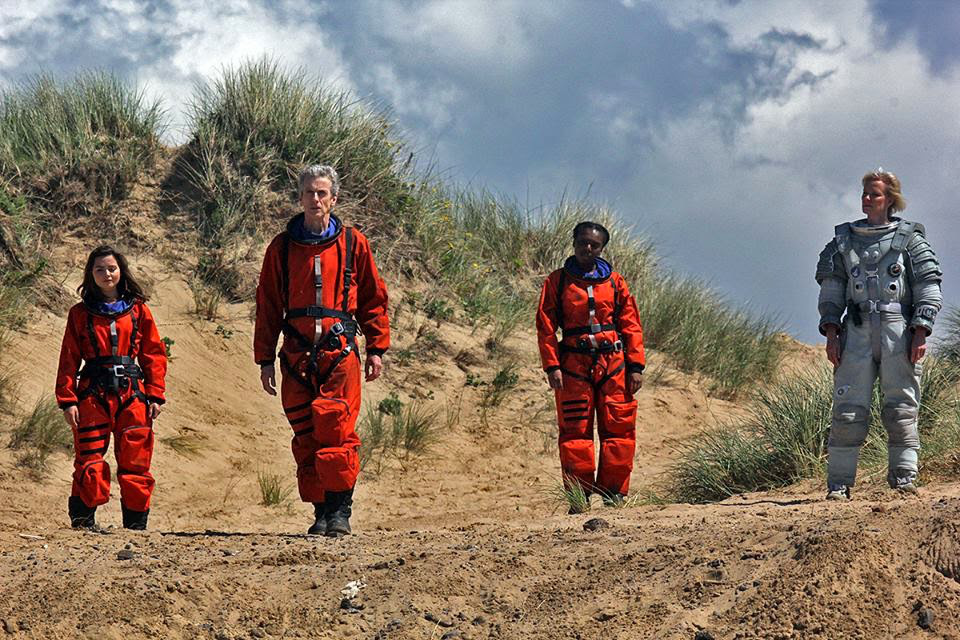We keep coming back to one word to describe Doctor Who scripts this season; a word we’ve used at least 3 or 4 times in our reviews – and one that we don’t think we’ve used for years prior to that. “Meaty.” Even when the scripts are problematic and the stories don’t quite make sense, we’re being served up some truly thought-provoking concepts and being shown that neither of our main characters is an entirely heroic or morally perfect person. And yes, there were parts of this episode that were extremely problematic (or even nonsensical), but that last 5 minutes was enough to recast our opinion about the entire hour after it was over.
If nothing else, we give showrunner Steven Moffat enormous credit for pulling off something so rare with showrunners that we can’t even come up with one example of one who managed it well: completely altering the tone and message of the series smack in the middle of their own run on the show. We’re not talking shifts in tone or subtle changes in message; we’re talking about something so fundamentally different that it feels like there was a regime change behind the scenes that no one told us about. The difference between this season and the three immediately preceding it is so vast that it’s almost hard to believe the same person is in charge.For that reason alone, this is shaping up to be the best season of Moffat’s tenure, or at the very least, as good as his best season to date, which in our opinion was season five.
What started out as a modern, winking take on the extremely classic Doctor Who quarry episodes (e.g., those episodes in the long history of the show that were shot on location at a quarry doubling as an alien world) by the end turned into something quite different, giving Clara the chance to voice the kind of anger at the Doctor very few companions get to express. But while this season has been a clear and overt examination of the Doctor’s darker side, it’s also been a slightly less clear examination of Clara’s as well. Her anger at his actions this episode could just as easily have been turned on herself, and probably was, in some ways, a case of her yelling at him because she was defensive about her own recklessness. After all, what kind of teacher allows a student to be yanked off to the moon without so much as informing her caretakers or even explaining the risks to her? Clara gave the Doctor a pointed explanation regarding her “duty of care” to Courtney but it sounded to us like she was trying to remind herself of that duty as much as remind him. They’ve both been extremely reckless about their … for lack of a better term, “lifestyle.”
Why is the Doctor strolling up and down the hallways of Coal Hill school like he belongs there now? They’re not even trying to hide the TARDIS from anyone. Courtney apparently comes and goes as she pleases and neither the Doctor nor Clara seem particularly concerned about the fact that a minor with some behavioral issues is getting the full run of the TARDIS un-chaperoned, at times. Sure, it’s nice that Clara is worried about Courtney’s self esteem after the Doctor made her feel like she wasn’t special. And it’s interesting to explore the psychological side effects of being a young, impressionable woman in some form of relationship with an immortal alien being with tremendous power. For a being like that to dismiss a young person like that can be an incredibly painful thing, we imagine. And yet we’ve watched the Doctor mistreat and even abandon companions left and right over the years. There’s a subtle point being made (whether intentionally or not remains to be seen) that the Doctor is a little too dangerously entrenched in this companion’s life. His TARDIS seems to spend most of its time parked either in her living room or in her place of employment – and there’s never any explanation given as to why that is, since it’s not something he normally does.
But before we go deeper, we have to address the elephant in the room. Or the egg in the sky. One should never, ever expect real science from a show like this. And we would even argue that if one is expecting just internal consistency and well-written technobabble, they’re likely to be disappointed in a show like Doctor Who. Goofy science and fantasy is built into the show’s DNA. Complaining about it is akin to pointing out that Daleks have plungers. But even for this show, the “science” that fueled the story zoomed past “questionable” and landed on “nonsense” way too many times. Sure, the moon is an egg. Go with that. It’s a fun idea. But eggs don’t gain enormous amounts of weight as the creature inside gestates. And regardless of whether the moon hatches or explodes, there are going to be drastic effects on earth (none of which happened). And a newly hatched creature, no matter how fantastical, can’t immediately lay an egg as large as the one they just emerged from. Don’t even get us started on “germs” that just happened to look like spiders and could spin webs. Or why Courtney was carrying disinfectant in her backpack. Or how one could use a spray bottle on the surface of the moon. Or why, ten years after a mining colony was built on the moon, there were no working shuttles or spacecraft to be found anywhere but a museum. Or the fact that the original plan made no sense, because what were the bombs supposed to do about all the extra tons of weight causing all the problems down below?
No, it’s best in cases like this to just ignore it all with a handwave. It speaks of poor script-writing, and it’s frustrating, because it mars what could have been a purely riveting exploration of the Doctor’s relationship with humans. There has been some discussion that this story was a semi-veiled metaphor for abortion. It’s not for us to say whether anyone’s interpretation is the right or wrong one, so we’ll just say that we don’t see it in this case. It is notable that the Doctor left the decision as to whether to kill a fetus up to three women, but nothing else about this setup was analogous to an abortion. For one, there was no mother involved in the story, for another the fetus was in the process of being born. For yet another, there were millions, if not billions of lives at stake. And it seems to us that the majority of people claiming it was an abortion metaphor are American and perhaps not taking into account that it’s less of a defining political issue for the British.
In fact, we had a hard time accepting that there was all that much of a moral dilemma here. Assuming that the bombs could actually do something (and even the Doctor thought that was true), we fail to see how killing one unknown creature who is threatening all life on earth is all that hard a decision to make, “baby” or not. One outer space creature or millions of people on earth? This is a question? Really? But if you wave away the poor science and accept the dubious premise of the moral dilemma, then you can get down to examining the Doctor’s actions here. Like we said, it speaks of poor script-writing that we have to do so much to get to the point of the episode.
So, shoveling all the crap out of the way and getting to the heart of the matter, did Clara have a point? Yes. Sort of. The Doctor is wildly inconsistent and we feel like, rather than being called out for not helping this time, he’s being called out for being capricious and unreliable. Of course the Doctor has interfered in human (and other) history whenever it suited him or circumstances called for it. The issue here isn’t that he didn’t help; it’s that you can’t ever trust or rely on him. Clara’s finding out that her mentor/ex is fallible and she’s reacting more to that than to how much or how often he helps people. She’s angry at him for putting courtney and her in a position they never asked for and for which they were ill-suited; a situation that was practically guaranteed to give them both post-traumatic stress disorder. “It’s time to take the stabilizers off your bike,” he told Clara. But does he have that right? People like Rose Tyler and Martha Jones and Amy Pond loved him for pushing them way past their boundaries, but does every companion have to love that sort of thing? We suppose the point is, that’s part of the deal if you ride with the Doctor. You get adventure and fun and awe, but you also get to be thrust into war zones and forced into making impossible life or death decisions that will likely haunt you for the rest of your life. This is why there’s such a focus on soldiers this season. The show has referred to the Doctor’s companions as such in the past, but this is the first time it’s really explored what that means on a psychological level for these characters. And the fact that he routinely plucks young girls out of their lives and places them in these situations while expecting to be thanked and even LOVED for it, doesn’t speak well for the Doctor when you start really looking at his actions.
It was a deeply flawed and in some ways, annoying episode, but the question at the heart of it more than made up for it. We haven’t pondered an episode of Doctor Who more than we’ve pondered this one. This season is turning out to be better than we thought. We’ve said before that Moffat, during his tenure, has been pretty bad about exploring the emotional consequences of being a companion to the Doctor, but this episode represents the best, most mature examination of that very idea. We can’t help but be enthralled by it, even as we roll our eyes at some of the silliness of it.
[Photo Credit: BBC America]
Friday Leftovers Next Post:
Lea Michele in Cushnie et Ochs at the “American Horror Story: Freak Show” Premiere
Please review our Community Guidelines before posting a comment. Thank you!




